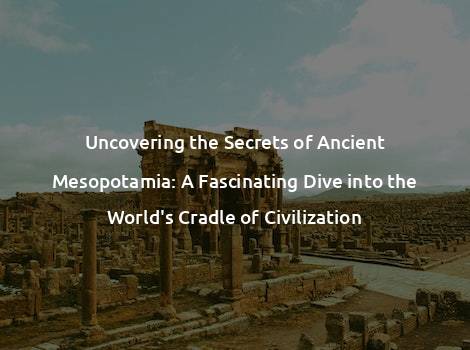Uncovering the Secrets of Ancient Mesopotamia: A Fascinating Dive into the World’s Cradle of Civilization
Mesopotamia, a historical region that is now part of modern-day Iraq, is often referred to as the “cradle of civilization.” It is one of the earliest and most influential civilizations in world history. The civilization that sprung up in Mesopotamia around 3500 BCE, was one of the first to use writing, developed advanced techniques in agriculture, and was skilled at trade and commerce. In this article, we will dive into the fascinating world of ancient Mesopotamia and explore its secrets that are still being uncovered today.
Mesopotamia, situated between the Tigris and Euphrates rivers, was an ideal location for civilization to flourish. The fertile land in this region allowed for successful agriculture, and the availability of waterways facilitated communication and trade between different regions. The Mesopotamians developed a complex system of irrigation and canals that allowed them to grow crops in abundance, especially wheat and barley.
Apart from agriculture, the Mesopotamians were also skilled in other areas such as metallurgy, pottery, and textile production. They traded these goods with their neighbors in exchange for commodities that weren’t readily available in Mesopotamia. Mesopotamia was not just a hub for trade but also a center for cultural exchange, which contributed to the evolution of the civilization’s art, architecture, and literature.
One of the greatest contributions of the Mesopotamians to human civilization was the invention of writing. They developed the world’s first script, Cuneiform, around 3500 BCE. Writing allowed for the preservation of important records, such as legal documents, accounting, and historical records. Cuneiform was written on tablets made of baked clay that were then stored in archives. These tablets have provided modern historians with a wealth of information on Mesopotamian society and culture.
The Mesopotamians were also highly religious, with a pantheon of gods and goddesses that controlled every aspect of life. The gods were believed to have created humans to work for them and provide them with offerings. Temples were built in honor of the gods, and offerings were made on a regular basis. Priests held a significant role in society and were responsible for communicating with the gods on behalf of the people.
Mesopotamia also saw the rise and fall of different empires. The first empire to emerge in Mesopotamia was the Akkadian empire, led by Sargon of Akkad, who conquered Sumer in the 24th century BCE. The Akkadian empire marked the start of an era of political and economic expansion. Other empires that emerged in this region included the Babylonian empire, led by Hammurabi, who introduced the world’s first legal code, and the Assyrian empire, which was known for its aggressive military campaigns.
In recent years, archaeologists have made several discoveries that have shed light on Mesopotamian civilization. One of the most significant discoveries was the Royal Cemetery of Ur, where the tomb of Queen Puabi was found. The tomb contained great wealth, including jewelry, musical instruments, and even a set of board games. The artifacts found here help researchers learn about the culture and lifestyle of the Mesopotamians.
Another exciting discovery was the ancient city of Uruk in southern Iraq. Uruk was the largest city in Mesopotamia, with a population of over 50,000 people. The city was home to some of the world’s earliest writing, and many of the oldest tablets have been discovered here. The area also contained a ziggurat, a massive stepped pyramid, which served as a temple.
Overall, the Mesopotamians revolutionized the world with their contributions to civilization. They invented writing, developed advanced techniques in agriculture, and were skilled at trade and commerce. Mesopotamia has left a significant impact on the world’s history and the study of its civilization continues to be a fascinating subject.
TLDR;
Mesopotamia, the cradle of civilization, was an early and influential civilization that developed writing, advanced techniques in agriculture, and was skilled in trade and commerce. They were highly religious and had a pantheon of gods and goddesses. Recent archaeology discoveries such as the Royal Cemetery of Ur and the ancient city of Uruk have shed light on the culture and lifestyle of the Mesopotamians. The study of Mesopotamian civilization continues to be a fascinating subject.







